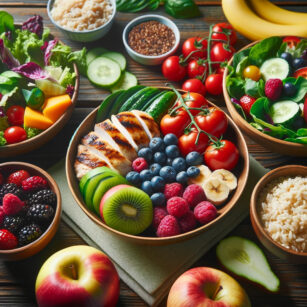Nutrition and Women’s Health: Beyond the Holidays
In this article:
Nutrition and a healthier diet top the list of so many New Year’s resolutions, but the impact of nutrition and women’s health extends far beyond the holidays. Did you realize that what you eat can affect everything from your period to your bone density?
At Chapel Hill OBGYN, we realize that your nutritional needs change throughout your lifetime, and we want you to live your healthiest life possible, whether you’re expecting your first child or entering menopause. If you’re overdue for your annual exam or if you are looking for a medical home, we’d consider it a privilege to serve you. Just contact us for an appointment.
In this article, we’ll look at the crucial role nutrition plays in our patients’ health, as well as how you can better understand and meet these needs.
Why Is Nutrition Important for Women’s Health?
Nutrition and women’s health are closely linked because these nutrients support their various unique physiological functions. Menstruation, pregnancy, breastfeeding, and menopause each require specific nutrients to maintain health and balance.
The benefits of a nutrient-rich diet include:
What Nutritional Needs Do Females Have?
Nutritional needs vary across different life stages. We’ll go into these individual nutrients in greater detail later, but some of the vital ones are:
- Iron
- Calcium
- Vitamin D
- Omega-3 fatty acids
- Folic Acid
Additionally, women need a good balance of macronutrients—proteins, fats, and carbohydrates—as well as a broad spectrum of vitamins and minerals to support overall health, hormonal balance, and energy needs
Essential Elements of Nutrition and Women’s Health
Following are some essential nutrients that should be a part of a woman’s regular diet. We’ll explain what they are and why they’re important.
Iron
This element is essential during menstruation due to the blood loss you experience when you’re on your period. It can be found in leafy greens and fortified cereals. Your recommended amount varies by your age and whether or not you’re still having your period.
Calcium
Did you know that of the estimated 10 million Americans with osteoporosis, more than 80 percent are women? Women are more likely to get this disease, and calcium is an important nutrient to protect your bone health. Calcium is found in dairy products, almonds, and leafy greens. The amount of calcium you need will vary depending on your age. Speak with us if you’re concerned that you may not be getting enough calcium in your diet and we will work closely with your healthcare team to be sure you get what you need.

Vitamin D
Vitamin D is needed to ensure your body adequately absorbs calcium. It’s found in fatty fish as well as fortified orange juice and other food fortified with this nutrient.
Folic Acid
This is a must for women of childbearing age, especially if you’re actively trying to conceive. This nutrient is vital to prevent birth defects. We typically recommend 400 mcg to 1,000 mcg of folic acid.
Omega-3 Fatty Acids
These represent the type of “good” fat that helps protect and support your heart health. It can be found in fatty fish, flaxseeds and walnuts
Be aware that some fish contain more mercury than others. For that reason, if you are pregnant or trying to become pregnant, we recommend you avoid certain types of fish.
The Mayo Clinic provides a useful guideline on how to consume seafood safely while pregnant.
How Can I Eat Healthy During the Holidays?
Nutrition and women’s health is about much more than avoiding second helpings at the family holiday festivities. Good nutrition is a lifelong endeavor. We know that healthy eating during the holidays is very challenging (especially when that relative brings your favorite dessert!) but we’ve created a few useful tips to help you:
How Can I Control My Eating During the Holidays?
Controlling eating during the holidays involves a combination of planning, mindfulness, and self-awareness. We recommend scanning the buffet or dinner table first. Then decide what you want to try. This will enable you to focus more carefully on portion control.
Be aware of emotional eating triggers, like stress or social pressure, and develop strategies to deal with them, such as taking a walk or engaging in conversation. Remember, it’s okay to indulge occasionally; the key is to enjoy in moderation and maintain a balanced diet overall.
Chapel Hill OBGYN Is Your Research for Nutrition and Women’s Health
Your overall health affects your gynecological health, and your nutritional needs change through the different stages of your life. That’s why, through adopting a balanced diet and ensuring you get the proper nutrients, you can maintain optimal health whether you’re in your reproductive years or entering menopause.
Don’t wait to prioritize your health. At Chapel Hill OBGYN, we’re committed to supporting you with state-of-the-art medical care in a comfortable and welcoming environment. Your health and well-being are our top priority.
We invite you to discover firsthand how our excellence and dedication earned us the Indy Best of the Best of the Triangle Award

Contact us today to schedule an appointment.

